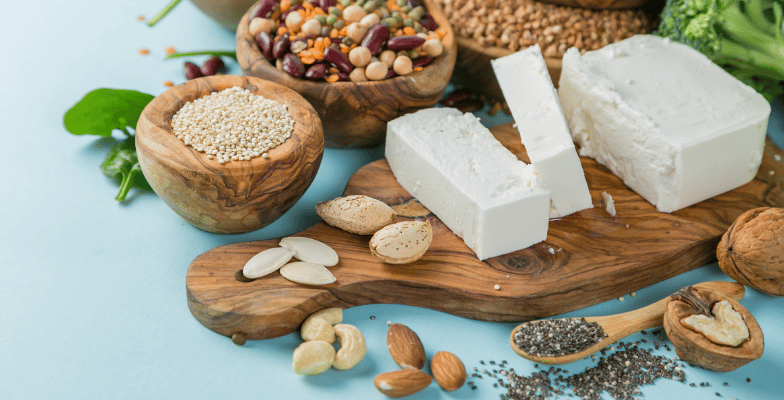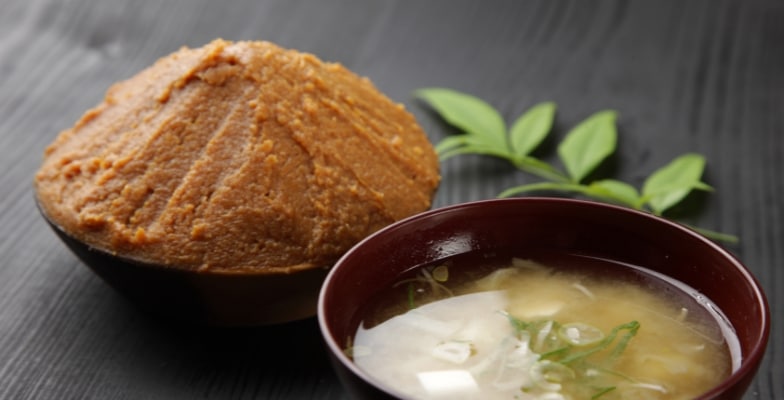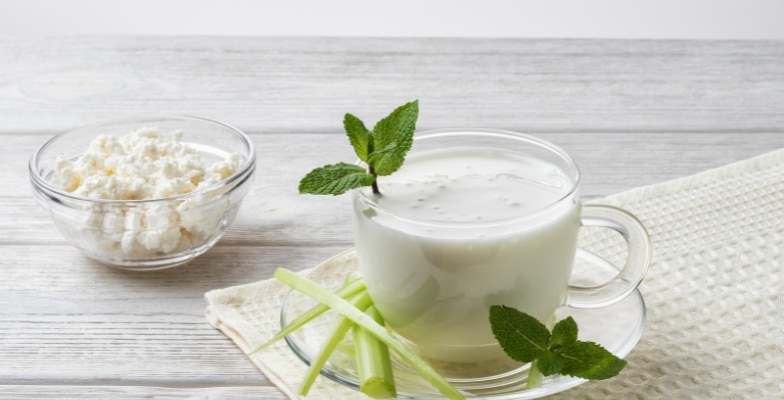7 Protein Rich Vegetarian Foods

Introduction
We know how important protein is for us. It not only provides building blocks for the body but also plays a variety of other vital roles.
Related Article: 6 Science-Based Reasons Why You Should Eat More Protein Every Day
Once, bodybuilders were seen as protein obsessed, but nowadays, most of us are well aware of the importance of this nutrient. Trainers, coaches, and dietitians often recommend a protein-rich diet. One of the common concerns about vegetarian and vegan diets is that they lack sufficient protein.
However, many experts admit that a well-planned plant-based diet can fill our daily protein requirements as certain plant-based foods are protein-rich. Let’s find out which ones.
Here Are Seven Protein-Rich Vegetarian Foods
Peanut Butter
Peanut butter is among the most loved spreads in the world. It is a food paste often made from ground, dry-roasted peanuts with excellent taste and texture.
Many commercial brands add ingredients such as sugar, vegetable oils, and trans fat. Eating an excess of these ingredients is linked to various health issues like heart disease, so it’s best to buy peanut butter containing just peanuts or make it at home. 1https://pubmed.ncbi.nlm.nih.gov/27550974/, 2https://pubmed.ncbi.nlm.nih.gov/19424218/, 3https://actascientific.com/ASNH/pdf/ASNH-02-0083.pdf, 4https://pubmed.ncbi.nlm.nih.gov/4033363/
Peanut butter contains all three macronutrients, along with essential micronutrients.
Two Tbsp Of Peanut Butter (32g) Provides
Calories- 190
Protein- 7 g
Carbohydrates- 8 g
Fat- 16 g
Health Benefits Of Peanut Butter
-Peanut butter can help maintain weight or even promote weight loss. 5https://link.springer.com/article/10.1007/s00394-017-1513-0, 6https://www.ncbi.nlm.nih.gov/pmc/articles/PMC2683001/
-It can foster heart health. 7https://www.ncbi.nlm.nih.gov/pmc/articles/PMC3902416/
-It helps control blood sugar levels, especially for women with obesity. 8https://docs.lib.purdue.edu/cgi/viewcontent.cgi?article=1004&context=fnpubs
-It provides an easy way to gain muscle, thanks to its high-calorie content.
-It may reduce the risk of breast cancer. 9https://www.ncbi.nlm.nih.gov/pmc/articles/PMC3903425/
Kidney Beans
Kidney beans have been called the poor man’s meat.
Beans are considered one of the richest plant-based protein sources. Kidney beans, especially, are used widely across the world. They come in a band of colors and patterns, comprising white, cream, black, purple, red, mottled, spotted, and stripped.
Raw or improperly cooked beans are toxic, but that’s not the case with well-prepared kidney beans, which have an important role in a well-balanced diet. 10https://pubmed.ncbi.nlm.nih.gov/23410632/
100g Of Boiled Kidney Beans Contain
Calories- 127
Protein- 9 g
Carbohydrates- 23 g
Fat- 0.5 g
Health Benefits Of Kidney Beans
-Kidney beans may lower the risk of excess weight gain and obesity. 11https://pubmed.ncbi.nlm.nih.gov/18845707/, 12https://pubmed.ncbi.nlm.nih.gov/7706585/
-They are useful for controlling blood sugar. 13https://pubmed.ncbi.nlm.nih.gov/23089999/, 14https://pubmed.ncbi.nlm.nih.gov/22494488/
-They may lower the risk of colon cancer. 15https://pubmed.ncbi.nlm.nih.gov/19653110/, 16https://pubmed.ncbi.nlm.nih.gov/9405582/
Tofu
Tofu is acquired from condensed soy milk driven into solid white blocks in a process similar to cheesemaking. There have been rumors that tofu is harmful to health, but research has a different opinion. 17https://pubmed.ncbi.nlm.nih.gov/24041244/
100 g Of Tofu Offers
Protein- 8 g
Carbohydrates- 2 g
Fat- 4 g
And these come with only 70 calories, which makes tofu highly nutrient-dense. Wondrous, isn’t it?
Health Benefits Of Tofu
-Tofu may reduce heart disease risk. 18https://pubmed.ncbi.nlm.nih.gov/23398387/, 19https://pubmed.ncbi.nlm.nih.gov/20709515/
-It may help reduce the risk of breast cancer. 20https://pubmed.ncbi.nlm.nih.gov/19860847/, 21https://pubmed.ncbi.nlm.nih.gov/23919747/
-It may reduce the risk of cancers of the digestive system. 22https://www.ncbi.nlm.nih.gov/pmc/articles/PMC3796344/, 23https://pubmed.ncbi.nlm.nih.gov/23812102/
-It may reduce the risk of prostate cancer. 24https://pubmed.ncbi.nlm.nih.gov/19838933/, 25https://pubmed.ncbi.nlm.nih.gov/24053483/
-It may reduce the risk of diabetes. 26https://pubmed.ncbi.nlm.nih.gov/23160185/, 27https://care.diabetesjournals.org/content/30/7/1871.short
Lentils
Lentils are edible seeds from the legume family. They are popular in Asian and North African countries. People eat lentils with or without their outer husk intact. There are different types of lentils, brown, green, yellow & red, puy, and beluga. Each type has a unique composition of antioxidants and phytochemicals. 28https://pubmed.ncbi.nlm.nih.gov/20058926/
One Cup (198g) Of Lentils Contains
Calories- 230
Protein- 18 g
Carbohydrates- 40 g
Fat- 1 g
Health Benefits Of Lentils
-Polyphenols (health-promoting micronutrients) in lentils may have antioxidant and anti-inflammatory effects, protect against neuronal injury, and improve blood sugar levels. 29https://pubmed.ncbi.nlm.nih.gov/25952846/
-Lentils may lower the risk of heart disease. 30https://www.ncbi.nlm.nih.gov/pmc/articles/PMC5713359/
-Lentils can increase HDL (good) cholesterol and reduce LDL (bad) cholesterol. 31https://pubmed.ncbi.nlm.nih.gov/26634200/
Chickpeas
Chickpeas are also a part of the legume family. They are high in protein and can be an excellent alternative to meat. Additionally, chickpeas are a rich source of vitamins, minerals, and fiber.
28g Of Chickpeas Offer
Calories- 46
Protein- 3 g
Carbohydrates- 8 g
Fat- 1 g
Health Benefits Of Chickpeas
-Chickpeas may help keep appetite under control. 32https://www.ncbi.nlm.nih.gov/pmc/articles/PMC2771510/, 33https://academic.oup.com/ajcn/article/87/5/1558S/4650426
-They can help manage weight. 34https://www.ncbi.nlm.nih.gov/pmc/articles/PMC3042778/
-They are beneficial for digestive health. 35https://www.ncbi.nlm.nih.gov/pmc/articles/PMC5188421/
-They support blood sugar control. 36https://www.ncbi.nlm.nih.gov/pmc/articles/PMC5188421/
-They may protect against certain chronic diseases like heart disease, cancer and diabetes. 37https://www.ncbi.nlm.nih.gov/pmc/articles/PMC4455821/, 38https://pubmed.ncbi.nlm.nih.gov/21831757/, 39https://www.ncbi.nlm.nih.gov/pmc/articles/PMC3257631/
-They are inexpensive.
Raw Cow’s Milk
Raw cow’s milk is an overlooked superfood. It’s called raw because it is not pasteurized or homogenized. Raw cow’s milk is versatile and can be used to make yogurt, butter, curd, ghee, ice cream, cheese, whey protein, and other products.
Cow’s milk is nutrient-dense. There are two kinds of protein in cow’s milk, casein and whey.
-Casein is an insoluble protein. Comprising 80% of total milk protein, casein helps absorb minerals like calcium and phosphorus. 40https://pubmed.ncbi.nlm.nih.gov/23958008/
-Whey is a soluble protein comprising 20% of the protein in milk. It is rich in BCAAs. As a result, whey is a favorite supplement for athletes and bodybuilders who want to grow or maintain muscles.
One Cup (240ml) Of Raw Cow’s Milk Has
Calories- 149
Protein- 8 g
Carbohydrates- 12 g
Fat- 8 g
Health Benefits Of Raw Cow’s Milk
-Raw cow’s milk may defend against asthma and allergies. 41https://pubmed.ncbi.nlm.nih.gov/23534445/, 42https://pubmed.ncbi.nlm.nih.gov/21875744/
-It contains antimicrobials that can build resistance against pathogens. 43https://pubmed.ncbi.nlm.nih.gov/23808865/
-Raw milk is full of natural vitamins.
-Raw milk helps prevent nutrient deficiency.
-High-quality calcium in raw milk can help maintain bone and tooth health.
-Casein and whey protein in raw milk may help lower blood pressure. 44https://pubmed.ncbi.nlm.nih.gov/12540390/, 45https://pubmed.ncbi.nlm.nih.gov/19893505/
Hemp Seeds
Hemp seeds belong to the same family as the marijuana plant but contain less THC (tetrahydrocannabinol, the psychoactive compound found in plants of the cannabis genus)
Hemp seeds are exceptionally nutritious. They contain a good amount of magnesium, iron, calcium, zinc, and selenium. What’s more, they are a good source of omega-3 and omega-6 fatty acids in the ratio considered optimal for human health.
Two Tbsp (20g) Of Hemp Seeds Contain
Calories- 111
Protein- 6 g
Fat- 10 g
Carbohydrates- 2 g
Health Benefits Of Hemp Seeds
-Hemp seeds may lower the risk of heart disease. 46https://pubmed.ncbi.nlm.nih.gov/21968645/
-They may help alleviate skin disorders. 47https://pubmed.ncbi.nlm.nih.gov/24600196/
-They may aid digestion. 48https://pubmed.ncbi.nlm.nih.gov/23609775/
-They may reduce symptoms of PMS (Premenstrual Syndrome) and menopause. 49https://pubmed.ncbi.nlm.nih.gov/21241460/
Conclusion
We know protein is essential, as it plays a role in functions necessary for survival. Meat products are marketed in a way that suggests a vegetarian diet is insufficient to fulfill our daily protein requirement, but that’s not true.
Many people, including bodybuilders, easily attain their daily protein requirements on a plant-based diet. A well-planned plant-based diet can provide sufficient protein and all essential amino acids, easily replacing animal-based proteins.
What do you think about these vegetarian foods? Have any questions?
Let me know in the comments below!

Skill-Based Education.
Global Recognition.
Powerful Community Building
Secure a certificate of completion in as little as a day by graduating from one of our free courses.
Get Access to Our Free Courses. No Credit Card Required.

Fabulous Body Membership
Your All-Access Pass to A Fabulous Body & A Rewarding Career
25+ Certificate Courses & Programs, All Included
15 Day Free Trial, 100% Money-Back Guarantee
About Rohit Kumar
Rohit Kumar is an avid writer who puts a lot of his emotions in words through his articles. Today, he is a certified fitness expert with a vast knowledge on nutrition and has contributed to the pages of Fabulous Body with his articles.











Rohit sir, your information are always helpful in many aspects, your way of explaining complex things in a very simple manner so that any person can understand it easily. I am always excited for your articles. Thank you very much for your efforts.
Hi there! brilliantly explained, the article succinctly decribes easily available food items which in turn will definitely help in maximum results. I would like the author to address a small personal query. I already intake lentils on a daily basis and try to intake all the food items discussed regularly. So, can too much protein be harmful for the body? Is there any restriction that I need to be aware of?
Hi Praveen,
Very kind of you to write such encouraging words for me. You know, readers like you give us the motivation to bring more energy to our work and present our best content in front of you. There are more great content to come. I am grateful to have readers like you. Thank you so much. 🙂
Hi Arnav,
Thank you so much for your words 🙂
Thanks for asking this question. It is one of the common concerns of people taking a high protein diet.
There have been rumors that high protein-intake causes kidney issues. However, there is no such significant evidence of any chronic kidney issues.
It’s just a myth. You can enjoy eating protein without worrying.
Nonetheless, if you already have kidney issues, it’s better to consult your doctor before you start a high protein diet.
Although there is no harm in taking extra protein, generally one’s daily protein requirement depends on his/her activity level, to know yours, you can check this article on “How Much Protein Should I Eat Per Day” [https://fabulousbody.com/how-much-protein-should-i-eat-per-day/ ]
Hello Rohit,
I had an query that plant based foods contain protein but it is less than other micronutrients like carbs and fat. and why you don’t add paneer ?
Hi Vikrant,
Thank you for asking these questions.
Yes, the carbs content in foods are generally higher. The reason is that the plant cells are mainly composed of polysaccharides (a carbohydrate).
And also, in the milk, the composition of lactose (a carbohydrate) is more than protein. But in some foods, protein content is higher than carbs, such as hemp seeds and paneer.
When we talk about the fat content in the food, it may be higher or lower in foods, like in the case of peanut butter, the fat content is higher than protein; however, in kidney beans, the protein content is higher than fat. It really depends on the composition of nutrients in the food. Different foods have different compositions.
We need 45%-65% of our daily calories from carbs, so these foods can also help us to reach our target.
Yes, paneer is an excellent source of protein. I remember when I used to eat a lot of paneer during my weight-gain journey. You can definitely add this to your diet.
Do you have more questions, please feel free to ask.
Till then, happy eating : )
Hello sir..
This is really good article for athletes as well as non athletes.
My question is.. My BMI is 18.3
So i am underweight and age 25,my body fat is 21.7% ,
Muscle 28.4 therefore I want to gain weight so can i take any musclegainer Or something?
Suggest me something good to develop muscles.
Thank you
Hi Kk,
I appreciate your words : )
And thank you for asking questions. This is one of the most common questions people ask.
Kk, You can gain weight eating healthy foods. I will not recommend taking any gainers as they are full of carbohydrates and most of which is sugar, which is very bad for your health.
The secret to weight gain is eating more calories than you burn.
This is the link to TDEE (Total Daily Energy Expenditure) calculator, click here, and fill the form with relevant data, and you will know how many calories you need to gain weight. Also, there are many FAQs below the calculator in the article; you may want to read them : )
I highly recommend getting your calories from healthy foods. Increase the servings of complex carbohydrates, proteins, and healthy fats.
You may eat carbs such as brown rice, whole wheat roti, and whole wheat pasta.
You may eat protein foods I have mentioned in this article, plus you can have paneer and chia seeds.
Healthy fats like ghee, coconut oil, avocado, extra virgin olive oil, cheese, etc. are also excellent for gaining.
There are many and many healthy foods, so why switch to unhealthy ones!
Also, I highly recommend you to do weight exercises to gain muscles and for overall fitness. If you don’t have access to that, you may do body-weight exercises (in case you are suffering from any disease, please consult your doctor first).
Remember, transformations take time. You need to be patient and do the right things. Results will come for sure.
Happy gaining : )